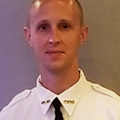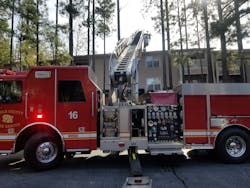Being the Chauffeur: Five Attributes to Succeed Beyond the Driver’s Seat
To every six-year-old who stands on the sidewalk looking at the fire truck go whizzing by, the job of driving that magnificent piece of technology might seem like the best and coolest job in the world. Yet to be that great engine or truck chauffeur takes more than just steering a big red vehicle through the streets. Chauffeurs must be on top of their game every shift.
The driver position shouldn’t be a spot to hide out or take it easy. Rather, the driver often is the most-worked position, be it on the fireground or in quarters.
Although the following list is by no means all-inclusive, it comprises many attributes that I have found that make up great chauffeurs.
The chauffeur can make or break crew continuity as well as fireground operations. On the flip side, a great crew always includes that chauffeur who knows the job and makes everyone else’s job easier.
Engineer
Nobody really associates being a firefighter and driving the fire truck to the complex job of engineering. Yet there is a reason many municipalities call their chauffeurs engineers. Like an engineer, chauffeurs must be able to use their head for complicated problems that are related to math and to knowing how to work and overcome problems that have complex systems, such as a fire pump or an aerial ladder, along with a multitude of things that might come up while on the fireground. Whether they be an engine or a truck chauffeur, these members must do quick deductions, calculations and equations, many times at early morning hours while under extreme stress.
Getting to the scene is only the first part of being a chauffeur. Once on scene, chauffeurs must determine the best apparatus placement based on the type and manufacturer of their rig and its capabilities. They must calculate the proper discharge pressures based on equations that must factor in the certain hose and nozzle types that are used, to obtain optimal flows inside at the nozzle. They must determine the best ladder options and placement. The list goes on.
Success on the fireground more often than not is determined by the decisions and abilities of the chauffeur.
Cartographer
I started my fire service career before GPS was on every smartphone. It wasn’t uncommon for lost travelers to stop at the fire station to request directions to where they were trying to get. Why did they stop at the firehouse? Because they assumed or knew that firefighters would know all of the nearby streets and exactly how to get to their destination.
As the chauffeur, it is first and foremost your job to know all of the ins and outs of your first due: the streets, their breaking numbers and exactly how to get from one street to another in the shortest manner possible; hydrant locations and/or nearby means of obtaining water supply; building types, their abnormalities, how to gain access and location of the fire department panels, boxes, etc.; and where you can and can’t fit your apparatus. If you are able to be this source of information, it not only lessens the load on the fire officer but allows that person to give more attention to the tasks that require attention.
Buffer
As the chauffeur, you are the buffer between the backstep firefighters and the officer—whether you are the senior member (which many chauffeurs are), newly promoted or newer in the fire service. You are the go-between for minor problems or issues or pretty much anything that doesn’t need to include the officer. You should be able to solve most minor problems and keep the firefighters in line, to assist in lessening what comes before and must be handled by the officer. Not only does this help to lighten the workload of the officer, but it is also providing you with experience in handling problems or fielding questions that will help when you become the officer.
Teacher
It shouldn’t be the officer’s job to initiate training and learning at the station level every single time. Rather, great chauffeurs will be the ones who challenge the younger or newer firefighters to train and learn. Great chauffeurs use their status as the informal leader to challenge the firefighters who are below them to learn. They can take and use the little moments, such as washing the rig or cooking dinner, to ask questions or to quiz the younger firefighters.
As the chauffeur, you naturally will be around the firefighters while the officer is tied up with paperwork or formal duties. It’s during these times that you can teach the firefighters and help them to grow and mature in their profession.
Mentor
Although it might not be the case everywhere, traditionally, as the chauffeur, at a minimum, you have a couple of years on the job; you might even be the senior member within your company. Therefore, take the new men and women under your wing. This might be their first job ever. Regardless, they need direction, and who else to give it out than you. You have the in with them, given the fact that you aren’t an officer and, thus, can talk to them frankly. You have the ability to mentor them and to help them to grow into what you are or even beyond that to the officer role. Furthermore, you have the opportunity to mentor them with life lessons, such as financial decisions, how to cook and clean, how to be a better parent, etc. Be that role model who they desperately need.
Beyond the basics
Being the chauffeur is an expansive role within the company that includes so much more than just driving to the scene. Chauffeurs are required to wear many hats and are an essential part of the company. With a good chauffeur, every shift runs a little smoother.
About the Author

Zachary Brown
Zachary Brown is a captain at the DeKalb County, GA, Fire Rescue Department (DCFR). He has been in the fire service for 15 years, the past 12 of which have been with the DCFR. Brown is a paramedic and has been a member of the DCFR technical rescue and dive teams.
